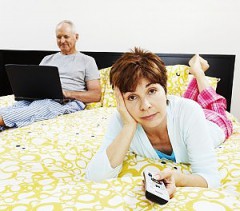MODERN LIVING DESTROYS OUR INNER CLOCK
Supplements to promote sleep

With the advent of electricity, as well as other amenities of modern life, the human body receives fewer natural stimuli that otherwise would mark the circadian rhythm, the '"internal clock" of the body, the rhythm of waking / sleep.
Kenneth P. Wright Jr., University of Colorado / Boulder (Colorado, USA), and colleagues monitored 8 participants, 6 men and 2 women, mean age 30 years, for a week, in their normal daily life. Participants wore wrist monitors that recorded the intensity of light they were exposed to, the timing of that light, and their activities, which allowed the researchers to infer when they slept. At the end of the week, the researchers also recorded the timing of the circadian clocks of the participants by measuring the presence of melatonin. The release of melatonin is one of the ways in which our body signals the onset of biological activity at night. Melatonin levels decrease again at the beginning of our day biology.
The same parameters were recorded during and after the second week, when the eight participants went camping in the woods in Colorado. During the week, the campers were exposed only to sunlight and the glow of a campfire. Flashlights and personal electronic devices are not allowed.
During the week in which the participants lived normally, woke up before their biological night was over. After the camp, during which the subjects were exposed to four times the light intensity usual, participants woke up only after their biological night was over. All individuals have been in tune with the natural rhythms (sunrise / sunset), even those who were inclined to stay up late and get up earlier. The study's authors say, then, that: "These findings have important implications for understanding how modern patterns of light exposure contribute to delay the time of sleep and can disrupt sleep and circadian clocks."
Spend a week only exposed to natural light, it is sufficient to synchronize circadian clocks with the times of sunrise and sunset. "When we are exposed to natural sunlight, our watches become perfectly in sync, in less than a week, with the solar day," said CU-Boulder, one of the authors of the study.
"When people live in the modern world, in built environments, it may cause a lot of differences between individuals," said Wright. "Some people are early risers, others always go to bed late. But in the presence of natural light-dark cycles reduces the differences between individuals."
Exposure to sunlight in the morning and at noon, can help regulate the internal clock. In addition, the darkening of electric lights at night: TV, phone, computer and other personal electronic devices, can help the internal circadian clock to stay more closely in tune with the solar day.
The study was published in the journal "Current Biology".
Source: Worldhealth
Supplements to promote sleep
